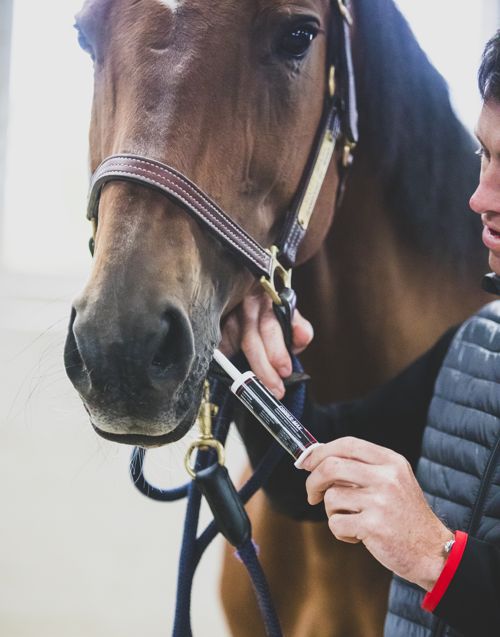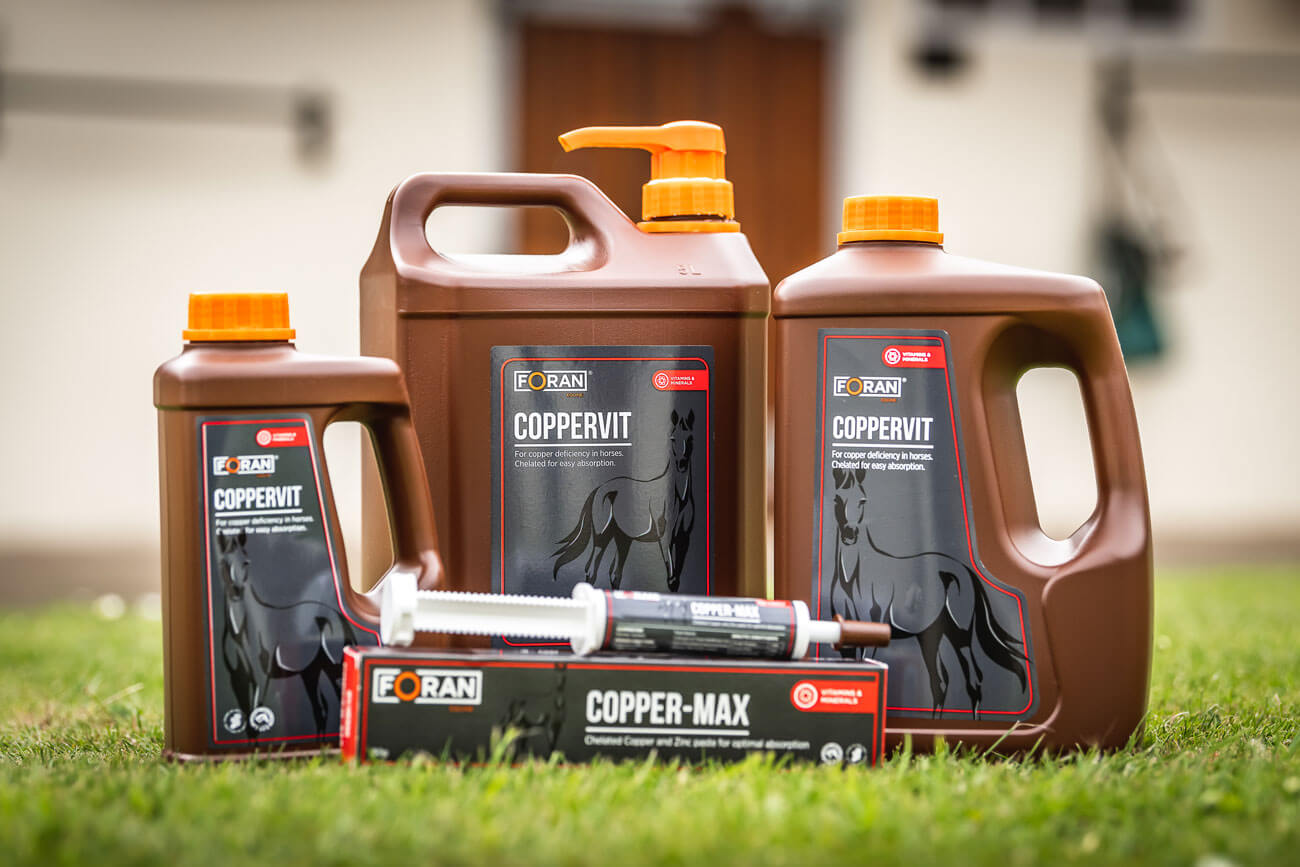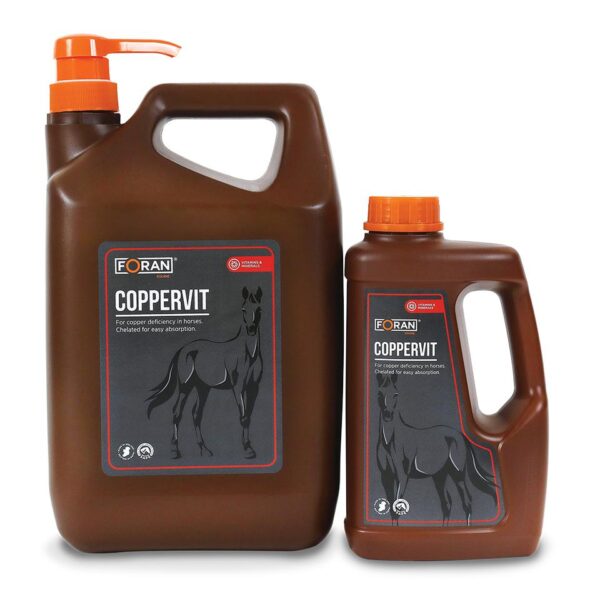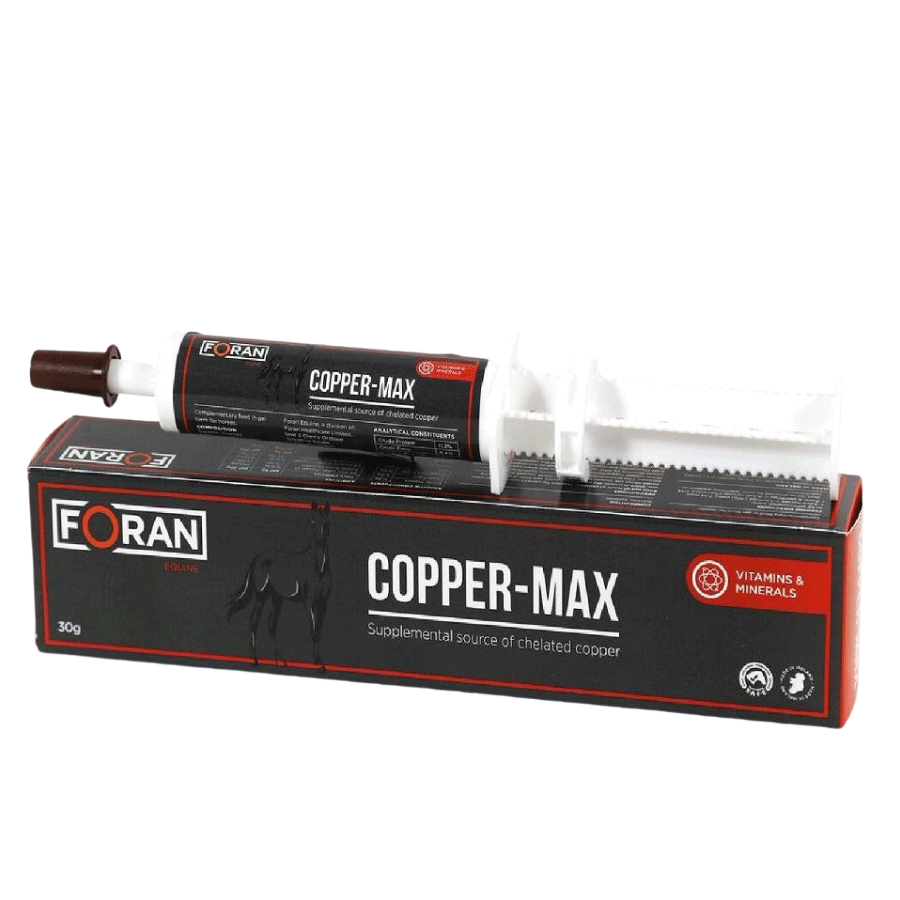Coppervit
Chelated minerals, antioxidant and B Vitamins combined to support growth and development
View ProductCopper is a vital component in the equine diet, especially for young horses. While forage like hay or haylage contains some copper, it typically falls short of the requirements necessary for breeding mares, stallions & young horses. Therefore, breeding mares and young horses require additional copper supplementation.
Copper is an essential mineral with several critical functions in the body. Its significance in feeding breeding mares, stallions and young horses arises from its role in preventing Developmental Orthopaedic Disorders (DOD) such as OCD in young horses.
Studies have indicated that ensuring pregnant mares receive adequate copper levels is essential. Research shows that young horses born to mares given equine copper supplements during pregnancy have higher copper stores in their liver. This is crucial because mare’s milk is naturally low in copper, and foals depend on these mineral reserves for healthy skeletal development during their early months. Additionally, young horses from copper-supplemented mares experience reduced inflammation of their bone growth plates (physicist) and fewer cartilage lesions, compared to those whose mothers were not supplemented. Therefore, it’s critical to ensure adequate copper intake during pregnancy and growth. Copper is often naturally lacking in the Middle Eastern horse’s diet.


Copper serves several essential functions, including:
– Acting as a co-factor for various enzymes, including lysyl oxidase, which is vital for cartilage formation.
– Supporting fertility by preventing foetal death, resorption, delayed oestrus, and abortion.
– Enhancing antioxidant function and immune health.
– Maintaining healthy connective tissues such as tendons and ligaments.
– Playing a role in producing melanin, the pigment that determines coat colour.
Copper and Other Minerals:
Copper absorption is complex and can be affected by other trace elements in the diet, including iron and molybdenum. Even if the diet provides sufficient copper, high levels of antagonistic minerals like iron and molybdenum can block copper absorption. To avoid this, it’s advisable to use a chelated copper supplement for horses. Chelated copper is bound to an amino acid, making it more easily digestible and absorbable, ensuring efficient utilization of this essential mineral.
Signs of Copper Deficiency in Horses:
Indicators of copper deficiency in breeding mares can include a loss of pigmentation around the eyes and an orange tinge to the coat, especially in horses with darker coats. A weakened immune system and increased susceptibility to illness or infection may also signal a copper-deficient diet. In young horses, unexplained lameness or joint swelling can suggest developmental orthopaedic disease. Evaluating the diet to ensure proper copper and essential mineral intake is crucial. When copper deficiency is suspected, it’s advisable to analyse grazing and forage to adjust the feeding and supplementation regimen.
A well-balanced stud feed, when fed at recommended levels, typically provides sufficient copper. However, additional equine copper supplements are wise when:
– Feeding preserved forage with below-average copper levels and high antagonist levels.
– Feeding significantly less than the manufacturer’s recommended intake of a specifically formulated stud feed.
– Ensuring adequate liver reserves throughout the year for performance horses that receive other mineral supplements that block copper absorption.
– Feeding supplementary copper during stressful periods, such as for young horses competing in shows or thoroughbreds beginning competition at three years old.
– Providing extra copper during the final trimester of breeding mares’ pregnancies to support optimal foetus liver stores.
– Supplementing additional copper to young horses aged 4-7 months who may not consume enough hard feed for optimal copper intake.

Foran Equine Coppervit from our range is a recommended solution as a daily copper supplement for horses. This palatable copper liquid supplement contains chelated copper, chelated manganese for bone health, vitamin E for immune support and colostrum quality, and biotin for hoof health. It can be added daily to the feed throughout pregnancy and is also suitable for young horses requiring extra copper.
Alternatively, for situations where daily supplementation isn’t feasible, consider Foran Equine Copper-Max paste, a convenient and concentrated source of chelated copper for horses in easy-to-use syringes. Depending on the horse’s needs, 3 syringes given 7-14 days apart may be required.
For more information on copper or equine supplements designed to support breeding animals and young animals, please reach out to our expert nutritional team.
Reference:

Chelated minerals, antioxidant and B Vitamins combined to support growth and development
View Product

Group Commercial Manager GCC Region
Based in the UAE, Nicolas Gaumerais is the Commercial Manager of the Connolly's RED MILLS Group which includes Foran Equine supplements and Connolly's RED MILLS horse feed in the GCC region. Nicholas regularly travels across the Gulf.